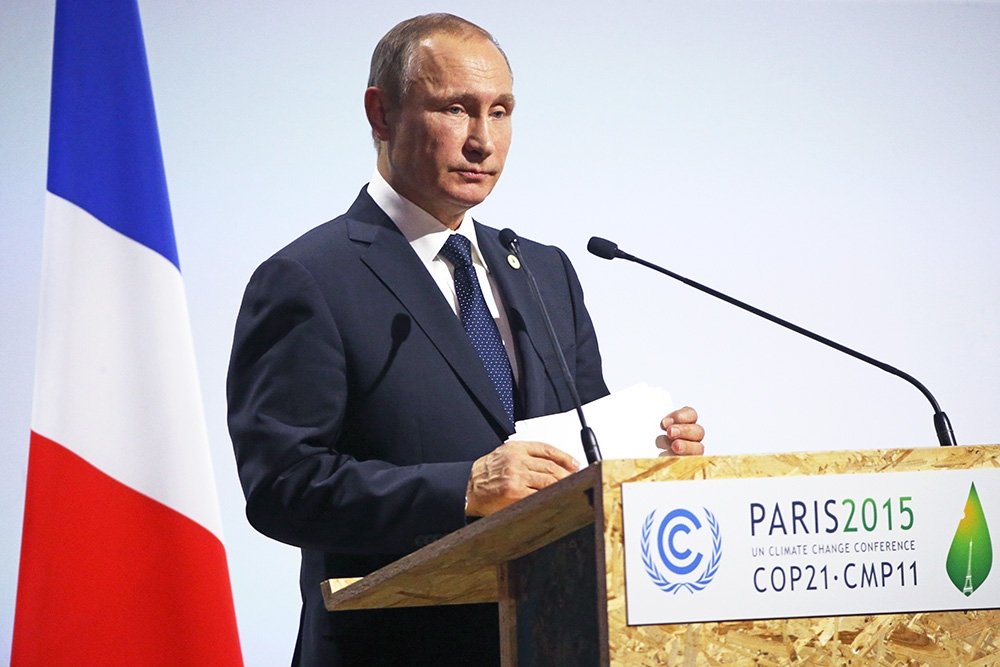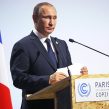
Putin Cannot Swallow the Turkish Insult—and Cannot Retaliate
Publication: Eurasia Daily Monitor Volume: 12 Issue: 213
By:

President Vladimir Putin is visiting Paris this week for the COP21 climate forum, but environmental matters will not be high on his personal agenda. Indeed, probably the only proposal Russia is willing to consider would be to replace coal with natural gas as the main fuel for electricity production. Thus, at the Paris summit, Putin will make some appropriate pledges to cut Russia’s emissions; but they are likely to be about as credible as his previous implausible promises to increase gas production from 578 billion cubic meters (bcm), in 2014, to 885 bcm, in 2035, which he had announced at the recent Gas Exporting Countries Forum, in Tehran (Kremlin.ru, November 23). What really matters to the Russian leader will be the meetings in the corridors of the crowded summit (as was the case at the G20 summit in Antalya, Turkey, last month), in particular his 30-minute talk with US President Barack Obama (TASS, TVN24, November 30); Putin’s own credibility at these exchanges is of paramount importance. The destruction of a Russian bomber by a Turkish fighter last Tuesday (November 24) is seen as direct hit on this credibility, but while Putin was furious about the insult, he is still searching for an appropriate response (Moscow Echo, November 26).
The Kremlin issued various economic sanctions against Turkey on Saturday night, but their immediate impact will inevitably be more painful for Russia’s own deeply troubled economy, which is suffering from severe inflation that is approaching 20 percent per year (Nezavisimaya Gazeta, November 27). Meanwhile, the cancelation of the bilateral visa-free-travel regime looks weak on the symbolic level, and in practical terms it delivers yet another blow to the depressed Russian tourism business (Kommersant, November 28). Putin has aggressively called the downing of the Russian Su-24 by Turkish F-16s a “stab in the back”; and while Ankara has countered with its own warnings about Russia “playing with fire,” the Turkish government has also demonstrated a readiness to de-escalate the rhetoric (Novaya Gazeta, November 26). Turkish President Recep Tayyip Erdoğan is trying to score maximum political dividends at home by showing toughness, as he seeks to present himself as a reasonable leader to Turkey’s allies in the North Atlantic Treaty Organization (NATO) by confirming his readiness to meet with Putin in Paris (Slon.ru, November 27). The fact of the matter is that Erdoğan’s ambitions in the Syrian war are served perfectly well by the quarrel with Russia as Turkey’s key role in the complex fight against the Islamic State (IS) and against Bashar al-Assad’s regime is effectively reasserted (Moscow Echo, November 27).
Russia’s role, on the other hand, which appeared so central two weeks ago, has now been compromised, and Putin is apparently looking for a military answer to this challenge (Gazeta.ru, November 25). So far, this answer has included the order to move the missile cruiser Moskva close to Latakia, to strengthen the air regiment there with an additional 10–12 Su-27 and Su-30 fighters to accompany the Russian bombers on their missions, and to deploy the most modern S-400 surface-to-air missile system to the Hmeimym airbase (Nezavisimaya Gazeta, November 26). Presumably, the Kremlin understands that any direct aggressive move against Turkey would signify a confrontation with NATO, which, while extremely reluctant to fight Russia, could not leave Turkey alone in the event of a hot conflict (Ezhednevny Zhurnal, November 27). Putin cannot take such a risk, but he has effectively delegated the next escalatory decisions to the fighter pilots, who may again encounter Turkish F-16s across the meandering and invisible border, and to the Russian S-400 operators, who until now have never seen combat.
Another dangerous incident in the air is, therefore, highly probable, but there are also other risks accumulating because of the Russian intervention. Mounting tensions might compel Ankara to close the Bosporus and the Dardanelles to the Russian Navy—permitted by the Montreux Convention (1936) in case of a military threat to Turkey—thus cutting this crucial sea line of communications to Latakia (Rbc.ru, November 25). And while Russian air strikes on Turkmen villages in Syria irritate Turkey, Moscow’s complete disregard for civilian casualties generates outrage among many Syrian rebel groups, turning the Russian base in Syria and the convoys going to and from Tartus into priority targets for terrorist attacks (Newsru.com, November 28). At the same time, the arrival of more planes to the crowded and poorly prepared Hmeimym base negatively affects maintenance schedules, making technical failures all but inevitable—particularly in light of this past year’s dismal record of crashes in the Russian Air Force and civil aviation. Last week, an Mi-8 helicopter crashed in Krasnoyarsk krai, resulting in the loss of ten lives (RIA Novosti, November 27). Any accident or setback could provoke an entirely disproportional reaction from the agitated and obsessive-compulsive Kremlin.
By demonstrating toughness while shifting the propaganda machine into high gear and concentrating it against Turkey, the Kremlin turns public attention away from deepening domestic troubles, recently exemplified by the unexpected but determined protest movement of Russian truck drivers (Rbc.ru, November 28). What started as a strike against a new road tax has evolved into mass outrage over corruption; and the government has no clue how to manage the problem (Novaya Gazeta, November 29). Authorities have attempted to respond by suggesting that any show of domestic discontent was working in collusion with an external “enemy,” thus justifying the need for repressive measures inside Russia (Moscow Echo, November 27). However, Putin is evidently unconcerned by the devastation of thousands of small businesses that his sanctions against Turkey are certain to cause. And his top brass and elite spooks feel “liberated” from economic concerns in charting the course based on applying military power as the main instrument of policy (Vedomosti, November 26).
The shortcomings of this course can remain obfuscated by bombastic rhetoric and jingoist mobilization for only so long. Whereas for key partners like China and main antagonists like Europe and the United States—whose ranks are all fast expanding in Turkey—Russia’s economic decline is plainly obvious. They may be puzzled about Putin’s unwillingness to pay economic interests much attention and by his readiness to punish Russia’s own economy for the sake of scoring political points against the unapologetic Erdoğan. But the other global powers are still hopeful that at least security risks are being taken into proper account in Moscow. However, Putin has no other choice but to raise the stakes again with the next disaster, which is already in the making, and it will take much collective effort and US leadership to check this brinksmanship.




